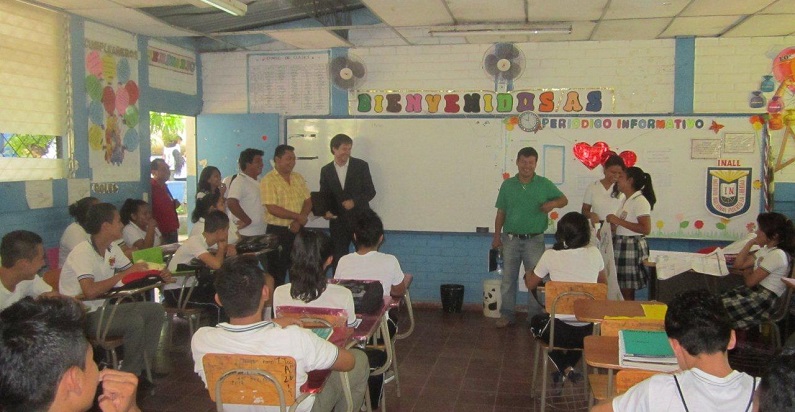-
06 August 2014
Category : Opinion
Social reality enters the classroom
Educación Fiscal en El Salvador, por Borja Díaz Rivillas FIIAPP/EUROsociALTax Education in El Salvador, by Borja Díaz Rivillas, FIIAPP / EUROsociAL

We descend from San Salvador to Puerto de la Libertad, 32 kilometres from the capital. The village is an example of the Central American country’s efforts to create quality community spaces and public services. Its wharf has a pleasant boardwalk, an amphitheatre for cultural events and numerous market stalls selling food and handicrafts. Families stroll, frequent the restaurants and enjoy panoramic views of the Pacific Ocean. Tourists practice surfing. Even the poorest neighbourhoods have electric lighting.
Enjoying public spaces is not easy in a country with high rates of violence and wide social gaps. The sectors with the highest incomes opt for private schools and hospitals; their residential and leisure spaces are also segregated from the rest of society.The Salvadoran government’s lack of resources accentuates this situation. The country, one of the poorest in Latin America, has a low tax collection rate, 14.9% of GNP compared to the average for the region of 19.4%, which is little more than half that of the countries of the Organization for Economic Cooperation and Development (OECD).
Paying taxes in El Salvador is often considered an obligation to be avoided rather than a civic duty. The lack of commitment to and trust in the government creates a vicious cycle. The Ministries of Finance and Education are looking for ways to break this cycle: tax education is one of them.
Juan Carlos Ibarra, a teacher in the National Secondary School of Puerto de la Libertad, invites us into his classroom. In 2009 he completed a seven-month Diploma in Tax Education. This year the tax theme was included for the first time in the official curriculum. Educational materials, training courses for teachers, recreational spaces and a week of tax culture were developed. EUROsociAL supported this entire process; six years later, we return to La Libertad to see the results. The Salvadoran tax education programme was awarded the National Prize for Quality and Best Practices in 2011. Today it is an international benchmark.
Juan Carlos explains that it was complicated at first. “Because one, being an adult, doesn’t like people talking to him/her about taxes”, he confesses. However, the final result was satisfactory: “I came to understand, like my colleagues, the importance of paying taxes. The country needs it, communities need it”.
The Deputy Minister of Education, Erlinda Hándal, tells us that few people imagine the magnitude of tax evasion and its impact on education, health, and social programmes that aren’t carried out or are left unfinished. “This impacts us”, she states.
El Salvador needs policies that will transform society; that is why it is essential to educate people about taxation. Carolina Quezada, adviser to the Ministry of Education, indicates that long-term processes are the ones that provide the best results.“We can have tax reform but, if we don’t change the mentality, the changes won’t be sustainable or transformative”, she emphasizes.
Tax education boosts citizens’ understanding of the importance of paying taxes, and also of the right to see taxes used effectively. With the Transparency and Access to Information Act, Salvadorans are in a better position to know how their taxes are being used. EUROsociAL has joined this effort and is participating in a new Diploma in Tax Education, Transparency and Access to Information, as well as in strengthening the agency that guarantees this right.
Professor Ibarra, like thousands of teachers, finds creative ways of promoting a culture of paying taxes: “I try to make sure it’s not just technical; I link it to reality, and in the end the students understand that paying taxes is related to respect for public assets”.Ibarra asks his students to reflect on the importance of preserving school materials and facilities and not damaging the streetlights in Puerta de la Libertad—streetlights that bring lighting to the poorest areas thanks to the solidarity of everyone—and of maintaining the flower beds on the boardwalk, some of which have already been destroyed.
He introduced us to six students who have completed the Diploma in Tax Education. They are passionate about the subject and, now, months later, they are voluntarily promoting civic initiatives inside and outside of school. They are spreading their knowledge about taxation and citizenship through a radio programme. They hand out posters and leaflets in parks, investigate the mayor’s office to find out where taxes are going. They study the reasons that lead people to avoid paying taxes. They have a Facebook page and are rebuilding damaged parts of their school.
Their next project is to give talks in seven more schools. Diego is one of these students: “Before I didn’t know anything about tax education or taxation and its purpose and importance”.
Many of the country’s secondary schools are vulnerable to violence, and students face both social problems and the economic difficulties of their own families. Gang-related crime affects schools and, sometimes, as in the case of the La Libertad Secondary School, it requires the presence of the armed forces. Despite everything, these young people are motivated to change their living conditions, to build a better country. As Carolina Quezada emphasizes: “young people get motivated by new knowledge, and they seize opportunities to do things better. What’s more, they have the desire to transmit what they’ve learned to other people, because they now know the benefits to the country of having more resources”.
We left the La Libertad Secondary School, the entrance of which is guarded by armed soldiers, a scene that contrasts with the school mural on the La Libertad docks, alive with the vibrant colours of the sunset.
The views and opinions expressed in this blog are the sole responsibility of the person who write them.




